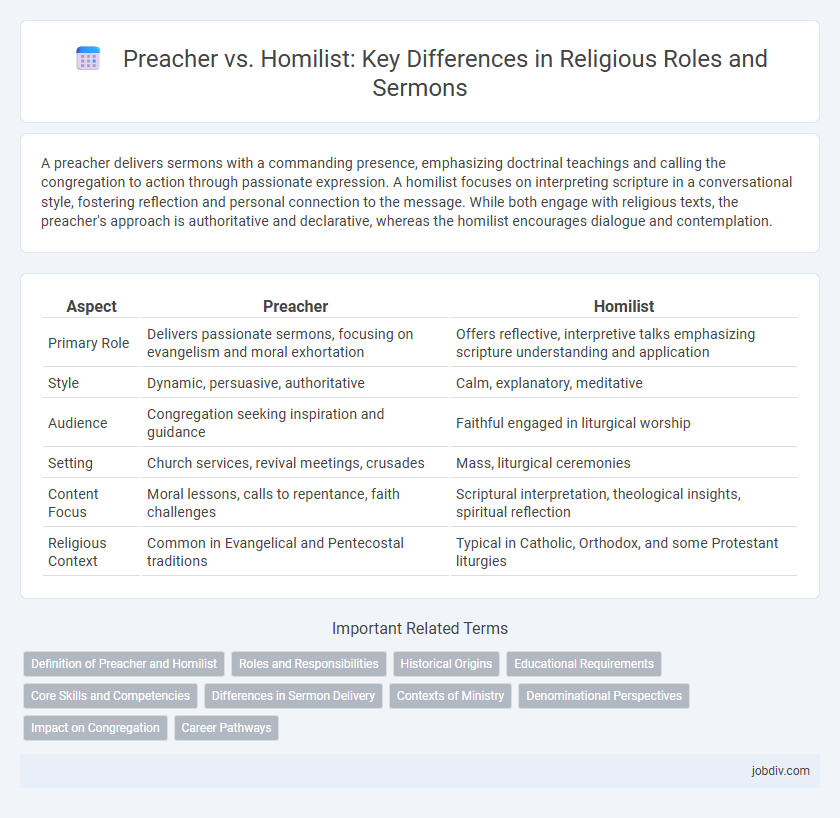A preacher delivers sermons with a commanding presence, emphasizing doctrinal teachings and calling the congregation to action through passionate expression. A homilist focuses on interpreting scripture in a conversational style, fostering reflection and personal connection to the message. While both engage with religious texts, the preacher's approach is authoritative and declarative, whereas the homilist encourages dialogue and contemplation.
Table of Comparison
| Aspect | Preacher | Homilist |
|---|---|---|
| Primary Role | Delivers passionate sermons, focusing on evangelism and moral exhortation | Offers reflective, interpretive talks emphasizing scripture understanding and application |
| Style | Dynamic, persuasive, authoritative | Calm, explanatory, meditative |
| Audience | Congregation seeking inspiration and guidance | Faithful engaged in liturgical worship |
| Setting | Church services, revival meetings, crusades | Mass, liturgical ceremonies |
| Content Focus | Moral lessons, calls to repentance, faith challenges | Scriptural interpretation, theological insights, spiritual reflection |
| Religious Context | Common in Evangelical and Pentecostal traditions | Typical in Catholic, Orthodox, and some Protestant liturgies |
Definition of Preacher and Homilist
A preacher is a religious leader who delivers sermons with the primary goal of proclaiming and explaining religious doctrines to inspire faith and moral behavior in the congregation. A homilist specializes in homilies, which are shorter, practical messages that interpret scripture and apply biblical lessons to everyday life. Both roles are essential in religious teachings, but preachers emphasize doctrinal authority while homilists focus on relatable spiritual guidance.
Roles and Responsibilities
A preacher primarily delivers sermons focused on interpreting scripture to inspire faith and encourage moral conduct within a congregation. A homilist specializes in crafting and presenting homilies that emphasize practical applications of biblical teachings during liturgical services. Both roles require deep theological knowledge, but preachers often address broader spiritual themes, while homilists concentrate on contextualizing scripture for everyday Christian living.
Historical Origins
The historical origins of the preacher trace back to early Christian leaders who publicly proclaimed scripture and guided congregations in faith. Homilists originated within the early church as interpreters of scripture, delivering homilies that provided practical moral teachings during liturgical services. This distinction highlights how preachers emphasize proclamation and exhortation, while homilists focus on scriptural interpretation and application in historical Christian worship.
Educational Requirements
A preacher typically requires formal theological education, often including a seminary degree such as a Master of Divinity, to ensure deep scriptural knowledge and pastoral training. In contrast, a homilist may not need extensive formal education but should have strong rhetorical skills and a thorough understanding of the liturgical texts to effectively deliver sermons. Both roles emphasize communication, yet the preacher's educational background is usually more structured and comprehensive.
Core Skills and Competencies
A preacher excels in delivering powerful sermons with strong oratory skills, focusing on evangelism and exhortation to inspire faith and moral action. A homilist specializes in crafting theological reflections and applying scriptural teachings in a clear, relatable manner, emphasizing interpretive insight and pastoral sensitivity. Both roles require deep biblical knowledge, effective communication, and the ability to engage congregations spiritually.
Differences in Sermon Delivery
Preachers typically deliver sermons with an authoritative and formal tone, emphasizing doctrinal teaching and scriptural interpretation to inspire devotion. Homilists often adopt a conversational and relatable style, focusing on practical application and engaging the congregation through storytelling or personal reflection. The difference lies in the preacher's emphasis on proclamation and persuasion versus the homilist's aim for moral guidance and accessible spiritual insight.
Contexts of Ministry
Preachers typically deliver formal sermons aimed at inspiring and instructing congregations during worship services, emphasizing scriptural authority and doctrinal teaching. Homilists, by contrast, often provide shorter, more reflective messages within liturgical contexts, focusing on applying scripture to everyday life and fostering personal spiritual growth. Both roles serve distinct functions within ministry, shaped by denominational traditions and the needs of their faith communities.
Denominational Perspectives
Denominational perspectives distinguish a preacher as a cleric primarily focused on delivering sermons rooted in doctrinal teaching and authority, often within liturgical traditions such as Catholicism and Anglicanism. A homilist typically emphasizes practical application of scripture through homilies, prevalent in traditions like Eastern Orthodoxy and some Protestant denominations, where sermons are more conversational and reflective. These varying roles highlight theological priorities and worship styles across Christian denominations, influencing how sacred texts are interpreted and presented to congregations.
Impact on Congregation
A preacher's impact on the congregation often centers on passionate delivery that inspires faith and commitment, using persuasive rhetoric and emotional appeal to foster spiritual growth. In contrast, a homilist typically offers a more reflective and instructional approach, focusing on practical application of scripture that encourages personal reflection and ethical living. Both roles shape the congregation's understanding and devotion but differ in style and emphasis on emotional versus intellectual engagement.
Career Pathways
Preachers often pursue formal theological education and ordination, leading to leadership roles within religious institutions, while homilists may develop their skills through practical experience in delivering sermons and scriptural reflections without necessarily holding clerical office. Careers for preachers include pastoral positions, chaplaincy, and denominational leadership, whereas homilists frequently engage in roles such as religious educators, motivational speakers, or content creators focusing on spiritual messages. Both pathways emphasize effective communication of religious teachings but differ in institutional responsibilities and formal qualifications.
Preacher vs Homilist Infographic

 jobdiv.com
jobdiv.com